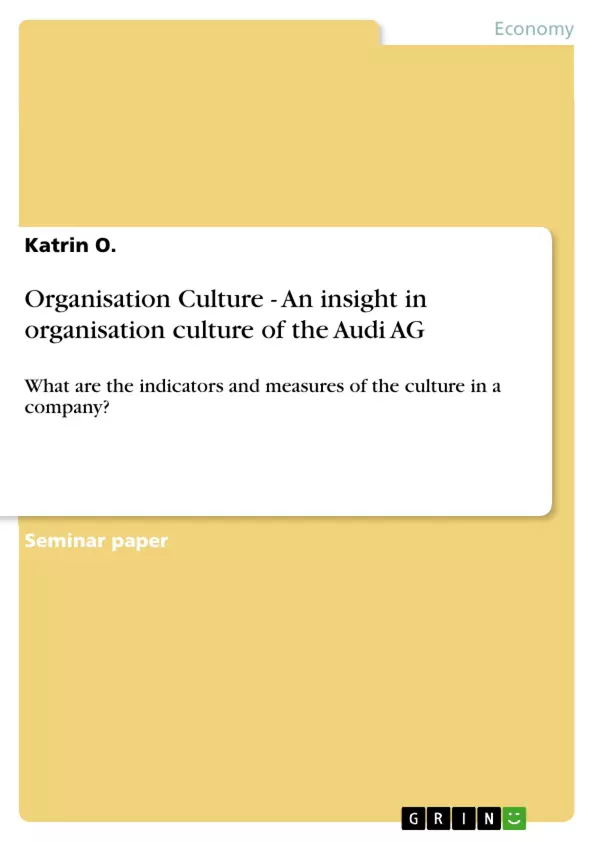This term paper is an elaboration on the subject of corporate culture. It explains
how a culture is created generally, what their functions are and how these can
be measured.
Compared with the cultures of different nations, different companies are also
different in their corporate cultures. A corporate culture is a framework for
human societies and relationships. This indicates how people have to behave in
this system and which standards or values have to be observed. Cultures are
dynamic processes that are constantly evolving and thus are incessantly
focused on improving themselves. With every change in the business
environment its corporate culture automatically changes too
The bases of culture are presented in detail in Chapter one. How a culture is
defined and which factors affect it forms the core of this section.
In the chapter two, the corporate culture of Audi is analyzed and explained.
The bases of this analysis are different indicators from different business units.
At the conclusion of the work the most important topics of the Audi corporate
culture are discussed.
Inhaltsverzeichnis (Table of Contents)
- Introduction
- 1 The Basic of the Organisational Culture
- 1.1 Culture Construction
- 1.1.1 Culture Definition
- 1.1.2 Development to an Organisational Culture
- 1.2 The Significance of Organisational Culture
- 1.3 Factors of Organisational Culture
- 1.3.1 Influence and power factors of the corporate culture
- 1.3.2 Indicators and measures
- 1.1 Culture Construction
- 2 The Audi AG
- 2.1 Description of the Indicators
- 2.1.1 Joint Targeting
- 2.1.2 Social Responsibility
- 2.1.3 Attitudes and Values
- 2.1.4 Company Supervision
- 2.1.5 Leadership behaviour
- 2.1.6 Entrepreneurship
- 2.1.7 Leadership continuity
- 2.1.8 Adaptation and Integration capability
- 2.1.9 Customer focus
- 2.1.10 Shareholder orientation
- 2.2 The Corporate culture of Audi AG
- 2.1 Description of the Indicators
Zielsetzung und Themenschwerpunkte (Objectives and Key Themes)
This term paper explores the subject of corporate culture, examining how culture is created, its functions, and how these can be measured. The paper uses the Audi AG as a case study to analyze a specific company's corporate culture, drawing on different indicators from various business units.
- Understanding the construction and definition of organizational culture
- Analyzing the significance and factors influencing organizational culture
- Exploring indicators and measures used to assess corporate culture
- Examining the corporate culture of Audi AG through various business unit indicators
- Discussing key aspects of the Audi AG's corporate culture
Zusammenfassung der Kapitel (Chapter Summaries)
Chapter one focuses on the fundamentals of organizational culture, defining its core elements and exploring how it is shaped. This chapter includes a discussion of the significance of organizational culture and the factors that influence its development. The chapter also delves into key indicators and measures used to assess corporate culture.
Chapter two presents an analysis of Audi AG's corporate culture. It explores a range of indicators, including joint targeting, social responsibility, attitudes and values, company supervision, leadership behavior, entrepreneurship, leadership continuity, adaptation and integration capability, customer focus, and shareholder orientation. This chapter provides an in-depth look at the company's corporate culture based on these indicators.
Schlüsselwörter (Keywords)
The key terms and focus topics of this term paper include organizational culture, corporate culture, culture construction, culture definition, factors influencing culture, indicators and measures of culture, Audi AG, business unit indicators, and company culture analysis.
Frequently Asked Questions about Audi's Corporate Culture
How is organizational culture defined in this paper?
It is defined as a framework for human societies and relationships within a company, indicating how people should behave and which values to observe.
What are the main indicators of Audi AG's corporate culture?
Key indicators include social responsibility, leadership behavior, customer focus, shareholder orientation, and entrepreneurship.
Is corporate culture a static or dynamic process?
It is a dynamic process that constantly evolves and changes automatically with every shift in the business environment.
What role does "Social Responsibility" play at Audi?
It is one of the core indicators used to analyze and explain the values that underpin Audi's organizational framework.
Why is leadership continuity important for Audi?
Leadership continuity is analyzed as a factor that supports the stability and long-term adaptation of the company's culture.
- Quote paper
- Katrin O. (Author), 2010, Organisation Culture - An insight in organisation culture of the Audi AG, Munich, GRIN Verlag, https://www.grin.com/document/183355



